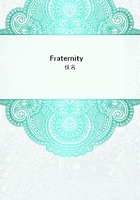
第84章
To understand the conduct of Hilary and Bianca at what "Westminister"would have called this "crisax," not only their feelings as sentient human beings, but their matrimonial philosophy, must be taken into account. By education and environment they belonged to a section of society which had "in those days" abandoned the more old-fashioned views of marriage. Such as composed this section, finding themselves in opposition, not only to the orthodox proprietary creed, but even to their own legal rights, had been driven to an attitude of almost blatant freedom. Like all folk in opposition, they were bound, as a simple matter of principle, to disagree with those in power, to view with a contemptuous resentment that majority which said, "I believe the thing is mine, and mine it shall remain"--a majority which by force of numbers made this creed the law. Unable legally to, be other than the proprietors of wife or husband, as the case might be, they were obliged, even in the most happy unions, to be very careful not to become disgusted with their own position. Their legal status was, as it were, a goad, spurring them on to show their horror of it.
They were like children sent to school with trousers that barely reached their knees, aware that they could neither reduce their stature to the proportions of their breeches nor make their breeches grow. They were furnishing an instance of that immemorial "change of form to form" to which Mr. Stone had given the name of Life. In a past age thinkers and dreamers and "artistic pigs" rejecting the forms they found, had given unconscious shape to this marriage law, which, after they had become the wind, had formed itself out of their exiled pictures and thoughts and dreams. And now this particular law in turn was the dried rind, devoid of pips or speculation; and the thinkers and dreamers and "artistic pigs" were again rejecting it, and again themselves in exile.
This exiled faith, this honour amongst thieves, animated a little conversation between Hilary and Bianca on the Tuesday following the night when Mr. Stone sat on his bed to watch the rising moon.
Quietly Bianca said: "I think I shall be going away for a time.""Wouldn't you rather that I went instead?" "You are wanted; I am not."That ice-cold, ice-clear remark contained the pith of the whole matter; and Hilary said:
"You are not going at once?"
"At the end of the week, I think."
Noting his eyes fixed on her, she added:
"Yes; we're neither of us looking quite our best.""I am sorry."
"I know you are."
This had been all. It had been sufficient to bring Hilary once more face to face with the situation.
Its constituent elements remained the same; relative values had much changed. The temptations of St. Anthony were becoming more poignant every hour. He had no "principles" to pit against them: he had merely the inveterate distaste for hurting anybody, and a feeling that if he yielded to his inclination he would be faced ultimately with a worse situation than ever. It was not possible for him to look at the position as Mr. Purcey might have done, if his wife had withdrawn from him and a girl had put herself in his way. Neither hesitation because of the defenceless position of the girl, nor hesitation because of his own future with her, would have troubled Mr. Purcey. He--good man--in his straightforward way, would have only thought about the present--not, indeed, intending to have a future with a young person of that class. Consideration for a wife who had withdrawn from the society of Mr. Purcey would also naturally have been absent from the equation. That Hilary worried over all these questions was the mark of his 'fin de sieclism.' And in the meantime the facts demanded a decision.
He had not spoken to this girl since the day of the baby's funeral, but in that long look from the garden he had in effect said: 'You are drawing me to the only sort of union possible to us!' And she in effect had answered: 'Do what you like with me!'
There were other facts, too, to be reckoned with. Hughs would be released to-morrow; the little model would not stop her visits unless forced to; Mr. Stone could not well do without her; Bianca had in effect declared that she was being driven out of her own house. It was this situation which Hilary, seated beneath the bust of Socrates, turned over and over in his mind. Long and painful reflection brought him back continually to the thought that he himself, and not Bianca, had better go away. He was extremely bitter and contemptuous towards himself that he had not done so long ago. He made use of the names Martin had given him. "Hamlet," "Amateur," "Invertebrate."They gave him, unfortunately, little comfort.
In the afternoon he received a visit. Mr. Stone came in with his osier fruit-bag in his hand. He remained standing, and spoke at once.
"Is my daughter happy?"
At this unexpected question Hilary walked over to the fireplace.
"No," he said at last; "I am afraid she is not.""Why?"
Hilary was silent; then, facing the old man, he said:
"I think she will be glad, for certain reasons, if I go away for a time.""When are you going?" asked Mr. Stone.